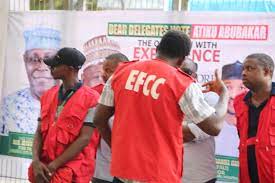An unlicensed foreign exchange broker, Chike Agada, has been taken into custody by officials of the Economic and Financial Crimes Commission (EFCC) from the Lagos Zonal Command for the alleged theft of N2 billion.
According to a statement released by the EFCC on October 11, 2023, Agada, a native of the Udi Local Government Area of Enugu State, was proclaimed wanted by the Commission for collecting money under false pretences and stealing by conversion to the tune of N2 billion.
On Monday, October 16, 2023, during a sting operation conducted by operatives of the Commission, he was taken into custody at a residence in the Bourdillon, Ikoyi neighbourhood of Lagos. This was as a result of credible intelligence linking him to the alleged fraud.
During the course of his arrest, a mobile device was discovered on his person. In addition, the commission stated that legal action against him would be taken as soon as the investigations were wrapped up.
Read also: Nigeria’s house of Reps stops banks from acquiring customers’ social media handles
How to spot a Forex fraud
Despite having fewer opportunities for fraud as a result of increased regulation in the foreign exchange industry, there are still issues that need to be addressed.
It is not uncommon for individuals and businesses who offer systems, such as signal sellers or robot trading, to sell items that have not been tried and do not produce successful outcomes.
Forex brokers who offer broad bid-ask spreads on particular currency pairings are engaging in unethical behaviour because this practice makes it more difficult to generate profits from trades.
Be wary of any broker that operates abroad and is not licenced.
If the forex broker is mixing customer cash with their own or putting restrictions on how much money customers can withdraw, this could be a sign that something shady is going on.
About EFCC
The Economic and Financial Crimes Commission, sometimes known as the EFCC, is a law enforcement agency in Nigeria that investigates a variety of financial offences, including money laundering and advance fee fraud.
The Economic and Financial Crimes Commission Act contains under its definition of economic and financial crimes any and all forms of fraud, money laundering, embezzlement, bribery, tax evasion, foreign currency malpractices, looting, and any and all forms of corrupt practices, among other offences.
There are three categories of offences: felonies, misdemeanours, and simple offences. Felonies are the most serious type of offence. A crime is considered to be a felony if it is either expressly designated as such by statute or if it carries the potential penalty of death or a sentence of incarceration for at least three years, even in the absence of a prior conviction.
The Economic and Financial Crimes Commission, also known as the EFCC, has advocated for the adoption of strategies that are both completely integrated and multifaceted in order to battle the epidemic of economic and financial crimes as well as other forms of corrupt behaviour.
The Economic and Financial Crimes Commission (EFCC) Academy may be found in Nigeria at No. 1, Idoma Way, Federal Housing, Phase 1, Karu Abuja. The Training and Research Institute (TRI) was initially formed in 2005, and the Academy was renamed the EFCC Academy in 2012. This change occurred not long after the TRI’s inception.
Those who joined the EFCC after completing their SSCE received a training stipend of between N15,000 and N25,000, while graduates received an allowance of between N20,000 and N35,000 alone. Take note that this benefit is only available to people who are already enrolled in training programmes offered by the EFCC.
About Forex
The market for exchanging currencies on a global scale, known as the foreign exchange market, is an over-the-counter or decentralised market. The value of one currency, expressed in terms of another, is established in this market. All aspects of purchasing, selling, and exchanging currencies at current or determined prices are included.
Foreign exchange traders, also known as forex traders, convert significant sums of money from currency to currency in order to bet on the movement of exchange rates. This is similar to the way stock traders buy and sell different equities. With an estimated net worth of $19.1 billion, Ray Dalio is often regarded as the forex trader who possesses the most wealth in the world.




